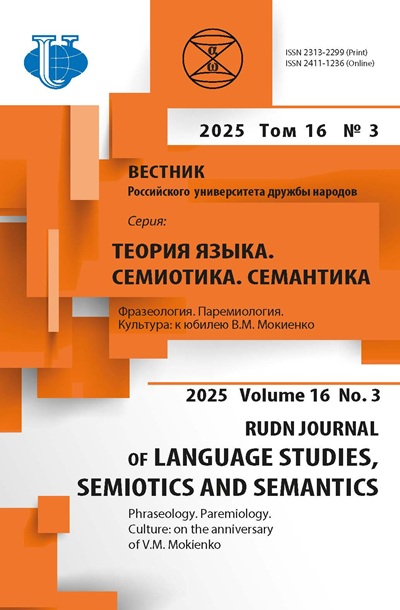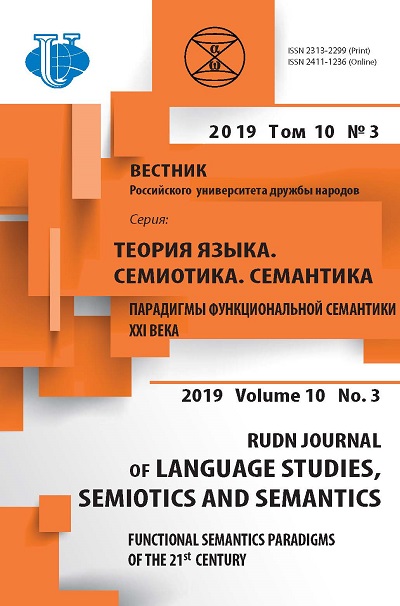Знак-прагмема как семиотическая доминанта аксиологического поля
- Авторы: Маркелова Т.В.1
-
Учреждения:
- Автономная некоммерческая организация высшего образования «Институт современного искусства»
- Выпуск: Том 10, № 3 (2019): Парадигмы функциональной семантики XXI века
- Страницы: 581-592
- Раздел: МЕТОДОЛОГИЯ И МЕТОДЫ ФУНКЦИОНАЛЬНОЙ СЕМАНТИКИ И ЛИНГВОСЕМИОТИКИ
- URL: https://journals.rudn.ru/semiotics-semantics/article/view/22116
- DOI: https://doi.org/10.22363/2313-2299-2019-10-3-581-592
- ID: 22116
Цитировать
Полный текст
Аннотация
В исследовании апробируется семиотический подход к системе оценочных знаков, выделяемых на основе прагматической функции. Традиционная триада - семантика, синтактика, прагматика - сопровождаются сигматикой как малоисследованной областью семиотики, детерминирующей связь между знаком и объектом. Система оценочных знаков - функция, коннотация, прагмема, их функциональные и семантические отличия - описываются сквозь призму семантической структуры слова, находящейся под влиянием прагматической функции. Нестандартный характер знака-прагмемы - денотативно-сигнификативный, выражающий природу свернутого суждения, ориентирован на субъекта речи и его аксиологические интенции. В статье исследуется семантическая, синтаксическая и прагматическая природа оценочного знака-прагмемы, демонстрируется специфика ее семиотической природы. Сопоставляются три типа оценочных знака - функции, коннотации, прагмемы - и определяется место прагмемы в их системе. Подчеркивается моделирующая роль прагмемы в аксиологическом фрагменте языковой картины мира.
Ключевые слова
Об авторах
Татьяна Викторовна Маркелова
Автономная некоммерческая организация высшего образования «Институт современного искусства»
Автор, ответственный за переписку.
Email: tvmarkelova@mail.ru
доктор филологических наук, профессор, первый проректор - проректор по учебной работе АНО ВО «Институт современного искусства», Заслуженый работник высшей школы РФ, Почетный работник профессионального образования
Москва, РоссияСписок литературы
- Шаховский В.И. Когнитивная матрица эмоционально-коммуникативной личности // Вестник РУДН. Серия: Лингвистика. 2018. no 1. С. 54-79.
- Кульчинский Г. Безъязыкая гласность // ХХ век и мир. 1990. no 9. С. 44-47.
- Пирс Ч.С. Элементы логики. Grammatica speculative // Семиотика. М., 1983.
- Ивин А.А. Основания логики оценок. М.: МГУ, 1970.
- Вольф Е.М. Функциональная семантика оценки. М.: Едиториал УРСС, 2002.
- Новиков Л.А. Избранные труды. В 2 т. Т. 1: Проблемы языкового значения. М.: РУДН, 2001.
- Morris Ch. Varieties of human value. Chicago; London, 1956.
- Витгенштейн Л. Человек и мыслитель. М.: Издательская группа «Прогресс», «Культура», 1993.
- Эпштейн М.Н. Идеология и язык (построение модели и осмысление дискурса) // Вопросы языкознания. 1991. no 6. С. 19-33.
- Morris Ch.W. Foundations of the Theory of Sings. Chicago, 1983.
- Маркелова Т.В. Прагматика и семантика средств выражения оценки в русском языке: монография. М.: МГУП имени Ивана Федорова, 2013.
- Савина А.П., Маркелова Т.В. Деривационные свойства прагмемы как особой единицы оценочной лексики // Вестник Российского университета дружбы народов. Серия: Теория языка. Семиотика. Семантика. 2015. no 4. С. 176-180.
- Словарь русского языка: в 4 т. / под ред. А.П. Евгеньевой. М.: Рус. яз., 1981-1984.
- Моррис Ч.У. Основания теории знаков // Семиотика: Антология / сост. Ю.С. Степанов. М.: Академический проект; Екатеринбург: Деловая книга, 2001.
- Новиков Л.А. Семиотика как наука о знаковых системах и общая лингвистика // Вестник РУДН. Серия: Лингвистика. 2003. no 5. C. 26-27.
- Соссюр Ф. де. Труды по языкознанию. М., 1977. C. 99-100.
- Степанов Ю.С. В трехмерном пространстве языка: Семиотические проблемы лингви8стики, философии, искусства. М.: Книжный дом «ЛИБРОКОМ», 2010.
Дополнительные файлы












